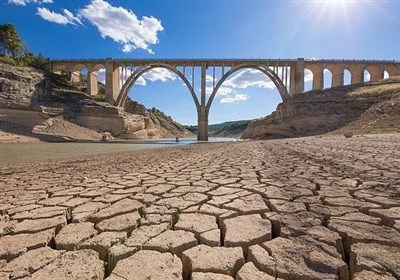Prominent Western expert: The current drought in Europe is the worst since 1766.
France and Italy are currently suffering from severe drought.
Dr. Andreas Marks, Scientific Coordinator at the Helmholtz Center for Environmental Research and Head of the German Drought Monitoring Organization, conducts research on hydrological modeling, climate, and runoff forecasting, as well as regional climate change, climate impacts, and adaptation. In an interview with the German newspaper “Tugschau” he said: In fact, the ground should be relatively wet in the middle of the winter. This means that we should actually have the highest amount of precipitation in the winter months and in the middle of it. Snow reservoirs accumulate and can then supply water to rivers in the spring and summer of next year.
He added: “The timing of the rain also ensures that the groundwater level in Europe will improve and rise again in a large area.” But the current situation is such that there is a deficit due to the lack of rainfall in recent weeks. At the same time, not only the last few weeks are problematic, but the lack of rainfall and the heat of the last few years have led to a large water deficit.
However, droughts develop very slowly, over months, and can last for years, and then take up to six months of above-average rainfall to subside again, the leading Western expert said elsewhere. slow
This is due to the fact that the lack of water in the soil can become so great that there is not enough water in the soil up to 150 mm – that is, 150 liters per square meter. And this cannot be solved by precipitation in a few days or even in a few weeks.
He added: It is also normal to see pits on the surface during the winter months. But the current situation is that when we penetrate deep there is a lack of water – although we see puddles on the surface. This means that the soil is now much drier than we have in normal years.
Dr. Marks stated in another part of this conversation: Forests and trees consume much more water. And it can be said with certainty that if the soil dries up to a depth of two meters in early May, this drought situation will remain in the summer and then it will be a stressful year for the forest.
He added: But it is still not possible to say with certainty what the situation will be like in 2023. We have to wait and see if the soil water tank will be completed in the next eight weeks.
This German expert went on to say: Basically, we have experienced the issue of saving water consumption in Germany in recent years. This is related to the fact that in many European countries, we have experienced since 2018 that droughts can lead to major losses in a wide range of sectors.
He emphasized: What you can do in this situation is to save water. This issue is now being actively addressed in France. People have been asked to conserve water. In my opinion, however, this is a relatively short-term solution. It is no longer private water use that needs to be addressed here but ensuring that all major water users – including industry in particular – are held accountable when it comes to saving water.
In another part of this conversation, he emphasized: We have seen here that a drought similar to the years 2018 to 2020 was not observed in any period since 1766 in Central Europe. He assessed the current drought in this region as the worst drought since 1766.
The German newspaper Handelsblatt also wrote in a report: France is drying up – and the government is now forced to adopt austerity measures. It hasn’t rained for 32 consecutive days, and France’s Meteo weather service reports the driest period since records began in 1959.









